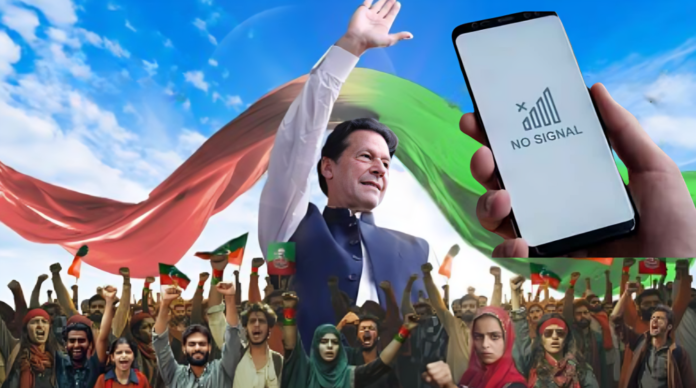The PTI protest internet blockade in Pakistan has sparked nationwide debates over digital freedoms and the economic implications of restricting access to communication platforms. This measure, reportedly implemented to control the dissemination of protest-related information during PTI-led demonstrations, raises significant concerns regarding its impact on civil liberties, the economy, and the country’s digital future.
The Decision to Block Internet Services
On May 9, 2024, following the arrest of PTI Chairman Imran Khan, Pakistan faced mass protests across major cities. In response, the government decided to block internet services in “sensitive areas” to maintain public order.
This move, described as a necessary step by officials citing security concerns, has faced strong backlash from civil society, legal experts, and businesses. Critics argue that this approach undermines fundamental rights such as freedom of speech and access to information, both enshrined in the Constitution under Article 19-A.
Economic Consequences of the Internet Shutdown
The internet blockade has had severe economic repercussions. The telecom sector alone suffered daily losses of around PKR 820 million, totaling an estimated PKR 10 billion in just three days. Small businesses, freelancers, and online service providers were particularly hard hit, with many unable to access essential platforms for their operations. Additionally, the Federal Board of Revenue reported a revenue shortfall of approximately PKR 2 billion during the blackout.
Broader Impacts on Society
Beyond the immediate economic losses, the blockade has damaged Pakistan’s global reputation as a reliable business destination. The restriction on digital connectivity has deterred foreign investors and raised questions about the government’s commitment to fostering a conducive environment for technological growth. Millions of individuals who rely on internet-based jobs, including ride-hailing drivers and delivery workers, faced substantial income disruptions during the blackout.
Legal and Civil Liberties Perspective
Legal experts have challenged the internet shutdown as unconstitutional, emphasizing that restricting access to information during crises is counterproductive. A petition filed in court argued that such measures violate the principles of democracy, which hinge on transparency and accountability. The judiciary has been urged to address whether national security concerns justify abridging citizens’ fundamental rights.
The PTI protest internet blockade in Pakistan has stirred widespread debates about its impact on civil liberties, economic stability, and digital freedom. Below is a detailed breakdown of the event and its implications:
1. The PTI Protest Internet Blockade in Pakistan: Context and Justification
-
Trigger Event: The blockade was initiated on May 9, 2024, following the arrest of PTI Chairman Imran Khan, which led to widespread protests.
-
Government’s Stance: Authorities claimed the blockade was essential to prevent misinformation and maintain public order in “sensitive areas.”
- Security Concerns: The government highlighted risks of escalating violence and vandalism due to organized dissemination of protest-related material online. The Ministry of Interior issued orders to temporarily suspend mobile internet and social media platforms.
2. Economic Repercussions
The internet blockade severely impacted Pakistan’s economy, particularly the digital and telecom sectors. Key consequences include:
-
Telecom Industry Losses:
- Estimated losses of PKR 820 million per day.
- The overall financial damage to the telecom sector reached approximately PKR 10 billion.
2. Impact on Small Businesses:
- Freelancers, small e-commerce vendors, and delivery service workers faced significant disruptions.
- Ride-hailing services reported up to 80% income losses during the blackout.
3. Revenue Shortfalls:
- The Federal Board of Revenue (FBR) noted a revenue drop of PKR 2 billion due to reduced economic activity.
4. Global Reputation:
- The shutdown signaled instability to foreign investors, potentially deterring future investment.
3. Social and Digital Impacts
The blockade disrupted the everyday lives of millions, raising questions about the government’s handling of digital rights:
-
Access to Information: Citizens were deprived of vital news updates, hindering transparency and accountability. Online education and remote work were severely affected.
- Legal and Constitutional Concerns: Critics argue the shutdown violates Article 19-A of Pakistan’s Constitution, which guarantees access to information. A petition filed in court labeled the move as unconstitutional and a breach of democratic principles.
4. Broader Concerns: Freedom vs. Security
-
Support for Digital Freedom: Civil rights organizations have emphasized that access to the internet is a basic human right in the modern age. Advocates warn against normalizing shutdowns as a means to manage dissent.
-
Government’s Counterpoint: Authorities maintained that national security must take precedence during volatile situations. Officials referenced incidents of violence linked to misinformation to justify their actions.
5. Legal Battles and Public Outcry
The legal fraternity and civil society have pushed back strongly:
-
Court Petitions: Petitions emphasized the role of internet access in fostering democracy and accountability. Lawyers argued that blanket shutdowns set a dangerous precedent.
-
Public Response: Online and offline protests erupted, with many criticizing the government for curbing fundamental rights. Activists highlighted the global trend of internet crackdowns in authoritarian regimes.
6. Key Takeaways and Recommendations
-
Key Lessons: Governments must balance national security with citizens’ digital rights. Internet blackouts have severe long-term economic and reputational costs.
-
Recommendations for the Future: Introduce clear legal frameworks to govern the use of internet shutdowns. Enhance digital literacy to prevent the spread of misinformation without resorting to extreme measures. Develop real-time content moderation tools instead of blanket shutdowns.
The Need for Dialogue
The PTI protest internet blockade in Pakistan underscores the complex interplay between security and digital freedom. While the government’s concerns about public order are valid, the long-term costs of such measures on the economy and civil liberties cannot be ignored. A balanced approach, involving transparent policies and stakeholder dialogue, is crucial to addressing future challenges.


